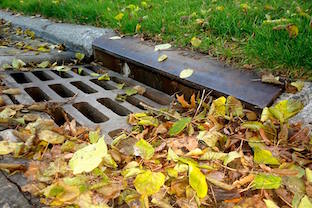 It’s fall in northwest Ohio, and if you’re a homeowner, you have most likely thought about what you will do with all the leaves appearing on your lawn. Some of you may already have a plan for your leaves this fall – rake them, bag them, mulch them, compost them, or just simply leave them! All of which are good options, but we are here to help you make the right decision for your home and make the connection between leaves and clean water. Many of us remember raking leaves as a kid, and then jumping into the piles, only to have to rake them all again. However, raking leaves is more than just fun and games. If you do not like having leaves on your lawn, consider using the leaves as compost for next year’s flowerbeds, around your trees, or in your garden. Once spread on gardens or flowerbeds, the leaves will begin to decompose and release nutrients back into the soil, naturally fertilizing them for next spring. If you don’t want to compost your leaves and instead want to pile them on the curb, think about your nearest storm drain. Similar to how the leaves decompose and release nutrients when left in the yard, leaves will also do this if left on the curb to eventually wash down to the nearest storm drain, stream, or ditch to enter the water system untreated. If thousands of leaves are entering the drains this fall, a large amount of excess nutrients is also entering the system, impacting the quality of our water. Leaves can also clog storm drains, resulting in potential flooding during rain events.
It’s fall in northwest Ohio, and if you’re a homeowner, you have most likely thought about what you will do with all the leaves appearing on your lawn. Some of you may already have a plan for your leaves this fall – rake them, bag them, mulch them, compost them, or just simply leave them! All of which are good options, but we are here to help you make the right decision for your home and make the connection between leaves and clean water. Many of us remember raking leaves as a kid, and then jumping into the piles, only to have to rake them all again. However, raking leaves is more than just fun and games. If you do not like having leaves on your lawn, consider using the leaves as compost for next year’s flowerbeds, around your trees, or in your garden. Once spread on gardens or flowerbeds, the leaves will begin to decompose and release nutrients back into the soil, naturally fertilizing them for next spring. If you don’t want to compost your leaves and instead want to pile them on the curb, think about your nearest storm drain. Similar to how the leaves decompose and release nutrients when left in the yard, leaves will also do this if left on the curb to eventually wash down to the nearest storm drain, stream, or ditch to enter the water system untreated. If thousands of leaves are entering the drains this fall, a large amount of excess nutrients is also entering the system, impacting the quality of our water. Leaves can also clog storm drains, resulting in potential flooding during rain events.
If you are going to pile the leaves on the curb, we ask that you think about two things before you do so: 1) distance to nearest storm drain and 2) next scheduled pickup date through your waste management provider. Pile the leaves on your easement, instead of directly on the pavement or curb. Also, check your local waste management to see when the next scheduled pickup for yard waste is so that you can plan to pile leaves around then. Some providers recommend putting leaves in a bag, which contains them much better than an open pile. However, some bags are not biodegradable while the leaves inside are. Check with your local waste provider to see what they prefer. The simplest option for handling your leaves this fall is to simply leave them where they lie. The leaves release nutrients back into the soil, create a natural cover for plants to winter over, and block weeds from sprouting early in the spring. However you wish to handle your leaves this fall, please remember to do so responsibly and properly. And use what Mother Nature has given us, free fertilizer for our gardens!
